
Owen Wingrave Press Coverage
“Stephen Medcalf ’s modern-dress staging, interspersed with military photographs, is mostly filmed in black and white on location — a garden for the scenes in Hyde Park, and a bright home counties villa that strikes me as too unspooky for James’s Paramore . . . musically it’s terrific, and Medcalf gets great acting performances from his cast.”
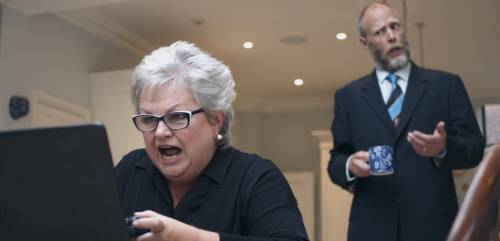

The Times ★★★★
“Wisely, Medcalf hasn’t attempted to ramp up the horror, although misty backdrops and artfully angular shots do occasionally recall those classic BBC adaptations of MR James (the black and white palette helps). Pragmatically, the setting is more or less present day, with the suggestion that young Wingrave is signing up for a pointless bloodbath in Afghanistan. The score is reduced to piano played by Chris Hopkins, and doom-laden strokes of percussion — the drums of war — from Craig Apps.”
The Stage ★★★★
“The virtue of the piece for socially distanced filming is that only seven singers are required. Britten’s 46-piece orchestra is reduced to just three players, the recorded boys’ choir to one treble. Rising baritone Ross Ramgobin makes every word of the title role tell in a performance notable for its complexity as well as assurance. Despite the danger of rendering his belligerent family as shrieking caricatures, Susan Bullock’s Miss Wingrave and Richard Berkeley-Steele’s Sir Philip manage to retain some humanity.”
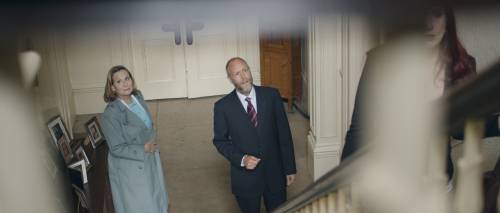
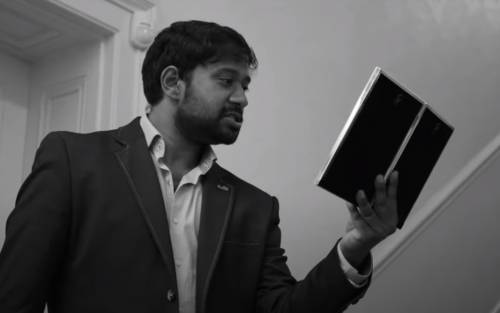
“A remarkable achievement
Hats off to Grange Park for putting together this project at such a difficult time, but Britten’s ‘pacifist opera’ isn’t one of his greatest.
Director Stephen Medcalf has boldly changed the setting from the imperialist 1890s to the present day, with the fiasco of the Gulf wars in the hinterland . . . Medcalf and his cameraman use real Home Counties domestic locations in sober black-and-white with unassertive fluency, and the cast gives such full-blooded performances that one’s attention is held.
Ross Ramgobin is immensely sympathetic as the high-minded Owen: one only wonders what on earth someone so nice could see in the chilly, catty Kate . . . sharply embodied here by Kitty Whately). Madeleine Pierard is her hysterical and frankly tiresome mother; James Way is Lechmere, the cocky cadet who makes play for the girl to Owen’s dismay. Both are excellent.
William Dazeley and Janis Kelly are staunch Mr and Mrs Coyle, voices of moderate if ineffectual sanity Owen’s grandfather played with perfectly judged authority by Richard Berkeley-Steele – and his psychotically unpleasant aunt, shown here by Susan Bullock as a dab hand at computer war games.
The project has been put together at great speed on a tight budget and filmed under severe covid-related restrictions. In these circumstances, it is a remarkable achievement. But the case for Owen Wingrave remains unproven.”
“Twenty-five years after playing Owen Wingrave on stage at Glyndebourne I had been asked to play Mr Coyle, Owen’s teacher, in a new film of Britten’s opera, produced by the ever adventurous Grange Park Opera. I was initially hesitant. But Wasfi Kani sold it to me by promising a scene with Janis Kelly in the bath. Little did I know that this particular scene would turn out to be a bubble bath nightmare; how on earth to maintain sufficient bubbliness to preserve Janis’ dignity and keep the continuity police happy during a long, soggy, late night shoot?” – William Dazeley
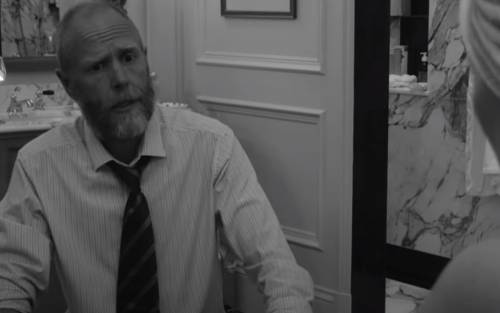

“Performances are passionate and nuanced, with all words clearly sung. Cameras linger on faces, so we see in up-close every trace of emotion. Director Stephen Medcalf has set the opera in 2001 on the brink of war with Afghanistan. While its setting is relatively recent, the decision to film entirely in black and white brings distance and dignity to this toxic family drama.”
Bachtrack ★★★★
“Medcalf dispenses with the scenario’s ghostliness yet, unlike the peaceful Owen, his production packs a punch.
The singers mime to a pre-recorded performance of themselves accompanied by the piano and percussion of Chris Hopkins and Craig Apps. Both musicians are outstanding, and once an oddly silent game of ping-pong is over the ear adjusts to the spare sound. The eye does, too, with the black-and-white of Fintan O’Connor’s sumptuous widescreen photography starkly flecked with poppy-red at key moments.
… some fabulous performances. Ramgobin fences against an A-team of Richard Berkeley Steele (General Wingrave) and the three witches of Paramore. Susan Bullock plays Miss Wingrave as a wargaming jingoist while Madeleine Pierard and Kitty Whately chew the soft furnishings as the Julians, mėre et fille. Tenor James Way shines youthfully as Owen’s friend Lechmere while William Dazeley and Janis Kelly do an admirable job of fleshing out the sympathetic if ineffectual Coyles. Conductor James Henshaw ensures a secure, finely balanced reading that teases out all the score’s latent potential.”
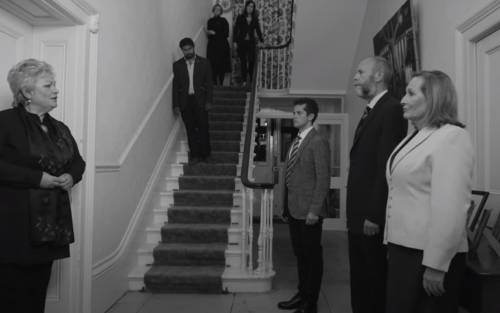
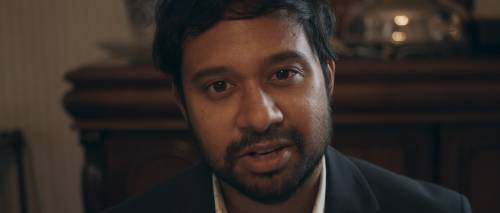
Planet Hugill ★★★★
“The film is a striking achievement. It was filmed during five days in September with minimal crew and other restrictions. But in the music and drama there is little sense of restriction, and Medcalf has used the very restrictions to create a striking and rather closely intense film. Throughout there is a feeling of claustrophobia, and the sound-track is similarly close with no artificial reverberance. The only sense of restriction comes from the accompaniment. Though finely played by Chris Hopkins and Craig Apps, the reduction for piano and percussion feels somewhat provisional, and we miss the wonderful colours of Britten’s full orchestration.”
“Filmed over a mere five days, it’s at once naturalistic and accessible as the constraints of COVID-19 meant the singers assembled their costumes themselves and the action unfurls in hallways, bathrooms, living rooms, seen through creative camera angles and the ghostly filter of black and white.”
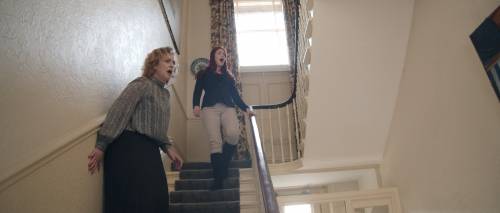

“Ross Ramgobin brings to Owen the determination and resilience of willing to endure the consequence of his actions because he believes he has right on his side. If you accept some revisionism of what Britten may want us to understand from his Owen Wingrave, then when our ‘hero’ is eventually broken by his unbending – and incredibly hostile – family it emphasises the powerful message of the sad ending.”
“It is left to Ross Ramgobin’s Owen to give us an emotional foothold. He finds an intensity in his delivery, a weight to his tone that suggests violence barely held in check, turning Owen from a saint into a much more interesting struggle of a man. The final shot (no spoilers here) opens up new possibilities for an opera whose flaws aren’t necessarily fatal.”
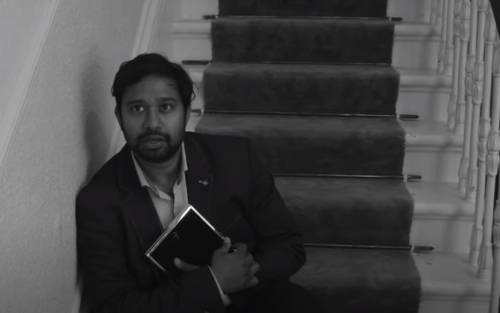
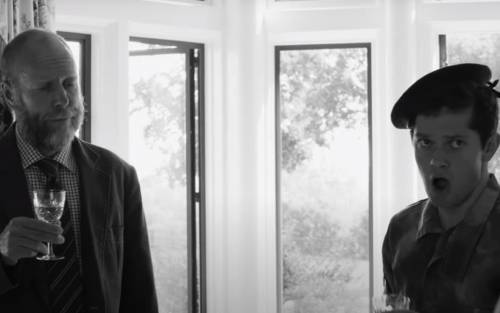
“Grange Park Opera’s Owen Wingrave – free on demand on YouTube – beautifully directed by Stephen Medcalf, superbly sung, brings Britten’s uneasy work to life in all its torment. Monochrome save for a ghostly, fluttering union jack, this filmed version captures the oppressive atmosphere of family life for the military Wingraves, who spurn the misfiit Owen. A top-flight cast is led by Ross Ramgobin in the title role and Kitty Whately, heart-wrenching as Kate. Gripping, taxing, rewarding.”